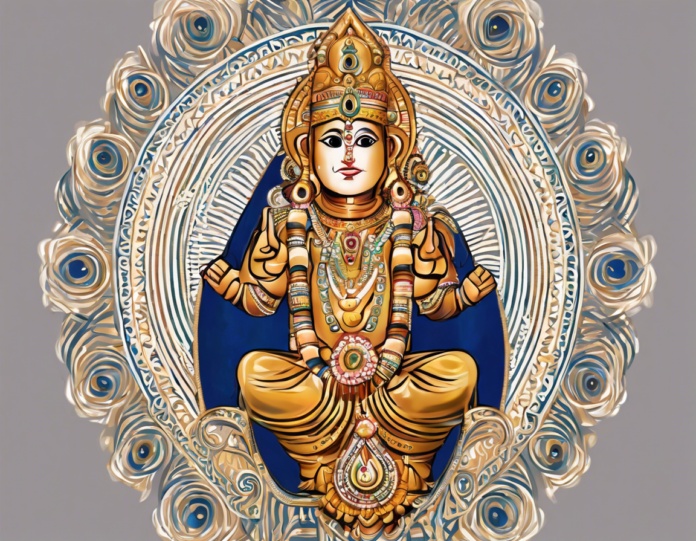Lord Venkateswara, also known as Lord Balaji, is a highly revered deity in Hinduism, particularly in South India. His temple in Tirumala, Andhra Pradesh, commonly known as the Tirumala Venkateswara Temple, is one of the most visited religious sites in the world. The spiritual significance of Lord Venkateswara encompasses various aspects including his divine qualities, symbolism, and the significance of worshiping him.
The Divine Qualities of Lord Venkateswara
Lord Venkateswara is often described as the Supreme Being who embodies attributes such as compassion, grace, and benevolence. Devotees believe that he is a protector who safeguards them from harm and showers blessings upon them. The deity is also revered for his unconditional love and forgiveness, which provide solace and spiritual upliftment to his followers.
Symbolism of Lord Venkateswara
In Hindu mythology, Lord Venkateswara is considered to be an incarnation of Lord Vishnu, the preserver of the universe. He is depicted standing on a lotus with four arms, holding a conch shell, a discus, and a mace, while his fourth hand is raised in a gesture of blessing. The symbolism behind these attributes signifies his role as a protector and bestower of divine grace upon his devotees.
Significance of Worshiping Lord Venkateswara
Devotees believe that worshiping Lord Venkateswara with sincerity and devotion can bring about spiritual growth, prosperity, and fulfillment of desires. The act of offering prayers, performing rituals, and making offerings to the deity is believed to invoke his blessings and protection. Many devotees undertake the pilgrimage to the Tirumala temple to seek the darshan (divine sighting) of Lord Venkateswara and to receive his grace.
Rituals and Festivals Associated with Lord Venkateswara
The worship of Lord Venkateswara involves various rituals and ceremonies that are performed with dedication and devotion. The chanting of Vedas, recitation of hymns, and offering of prasad (sacred food) are integral parts of the worship. Festivals such as Vaikuntha Ekadashi and Brahmotsavam are celebrated with great fervor at the Tirumala temple, drawing thousands of devotees who come to partake in the festivities and seek the blessings of the deity.
The Spiritual Teachings of Lord Venkateswara
Lord Venkateswara’s teachings emphasize the importance of leading a virtuous life characterized by compassion, truthfulness, and selflessness. Devotees are encouraged to cultivate devotion towards the deity and to serve others with humility and love. The deity’s teachings inspire individuals to strive for spiritual evolution and to recognize the divine presence within themselves and others.
Frequently Asked Questions (FAQs)
Q: What is the significance of Lord Venkateswara’s idol being made of the ‘Saligram Sila’ stone?
A: The idol of Lord Venkateswara is believed to be self-manifested and made of the ‘Saligram Sila’ stone, which is considered sacred in Hinduism. The stone is said to contain the presence of Lord Vishnu and is thus revered for its spiritual potency.
Q: Why is Lord Venkateswara often depicted with a lotus flower and a bell in his hands?
A: The lotus flower symbolizes purity and divine beauty, while the bell is believed to ward off negative energies and usher in positivity. These attributes signify the deity’s role as a protector and bestower of blessings.
Q: What is the significance of visiting the Tirumala Venkateswara Temple for devotees?
A: Visiting the Tirumala temple is considered a sacred pilgrimage that helps devotees seek spiritual solace, blessings, and fulfillment of desires. The darshan of Lord Venkateswara is believed to purify and uplift the devotee’s soul.
Q: How does chanting the ‘Venkateswara Suprabhatam’ benefit devotees?
A: Chanting the ‘Venkateswara Suprabhatam’ is believed to invoke the grace and blessings of Lord Venkateswara, bringing peace and prosperity to the devotee. The hymn is recited at dawn to awaken the deity and seek his divine intervention.
Q: What are the offerings commonly made to Lord Venkateswara at the temple?
A: Devotees typically offer Tulsi leaves, flowers, coconut, jaggery, and prasad such as laddu as offerings to Lord Venkateswara. These offerings symbolize devotion and are believed to please the deity and attract his blessings.
In conclusion, the spiritual significance of Lord Venkateswara lies in his role as a divine protector, benevolent deity, and bestower of blessings. Devotees revere him for his compassion, grace, and unconditional love, seeking his divine intervention in times of need. By worshiping Lord Venkateswara with sincerity and devotion, individuals can experience spiritual upliftment, prosperity, and fulfillment of desires, while also imbibing his teachings of virtue, compassion, and selflessness.


